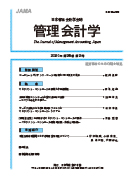Volume 28, Issue 2
Displaying 1-6 of 6 articles from this issue
- |<
- <
- 1
- >
- >|
Invited Article
-
2020 Volume 28 Issue 2 Pages 3-24
Published: March 31, 2020
Released on J-STAGE: April 15, 2020
Download PDF (839K)
Invited Articles
-
2020 Volume 28 Issue 2 Pages 25-35
Published: March 31, 2020
Released on J-STAGE: April 15, 2020
Download PDF (364K) -
2020 Volume 28 Issue 2 Pages 37-51
Published: March 31, 2020
Released on J-STAGE: April 15, 2020
Download PDF (570K) -
2020 Volume 28 Issue 2 Pages 53-67
Published: March 31, 2020
Released on J-STAGE: April 15, 2020
Download PDF (700K) -
2020 Volume 28 Issue 2 Pages 69-90
Published: March 31, 2020
Released on J-STAGE: April 15, 2020
Download PDF (1822K)
Case Research
-
2020 Volume 28 Issue 2 Pages 91-107
Published: March 31, 2020
Released on J-STAGE: April 15, 2020
Download PDF (2137K)
- |<
- <
- 1
- >
- >|
